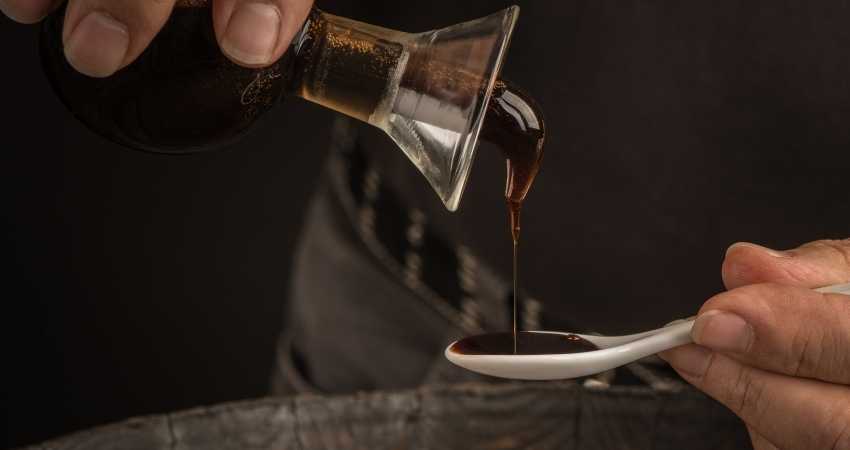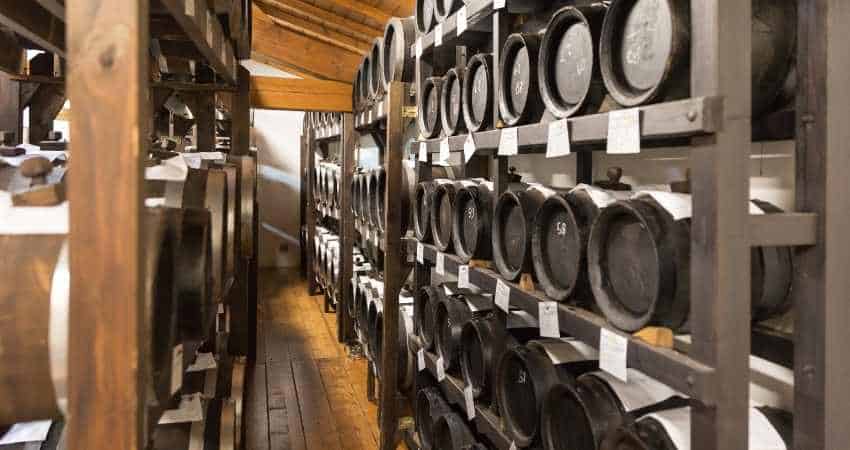Should You Refrigerate Balsamic Vinegar?
You may think it’s good to store balsamic vinegar in the refrigerator as we do with everything else that needs preserving. Some research says that may not be such a clever idea. Therefore, do you refrigerate balsamic vinegar?
Balsamic vinegar should not be refrigerated. The cold in the refrigerator alters the flavor and taste of balsamic vinegar. Humidity can cause condensation inside the bottle, and the water will dilute the vinegar.
There are many better places to store your balsamic vinegar to keep it safe. I’ll inform you the best way to do it and why. These methods will make certain it doesn’t lose its taste or quality.
Do You Refrigerate Balsamic Vinegar?

As a Certified Health Coach many clients ask me about food storage including balsamic vinegar. Also, I purchase and use it every week mostly for salads. Therefore, I have researched this topic in the past and present. Let’s examine the storage methods closely.
If you care about how your balsamic vinegar tastes, don’t refrigerate it1. The cold is an adverse environment for the vinegar because it can alter its flavor.
The vinegar can pick up undesirable flavors from other foods, and it might impart flavors to other food. Humidity in the refrigerator can cause the bottle to condensate, thus diluting the vinegar.
The opposite of refrigeration, heat, is not good for balsamic either. Like the cold, heat can change the flavor and taste of the vinegar. If you notice a store has displayed their bottles near a window, a heat source or in the sunlight, don’t buy it.
There are three types of balsamic vinegar2:
- Traditional
- Condiment
- Balsamic Vinegar of Modena I.G.P. (Store Bought)
Although the different types may last longer or shorter than the others, all three of them have the same standards when it comes to refrigeration or heat.
Does Balsamic Vinegar Go Bad if it’s Not Refrigerated?
Balsamic vinegar will not go bad if refrigerated. It has a bigger chance of tasting bad than turning if you store it in the refrigerator.
If you notice your balsamic vinegar became cloudy, don’t worry. It’s still okay and safe to use3.
To make sure your balsamic vinegar hasn’t gone bad look at the liquid. If you notice a small amount of sediment, it’s still okay to use. The sediment is most likely a compound called “mother of vinegar”. It is safe to eat and drink, but if it bothers you, you can strain it out with a coffee filter.
Watch out for some substantial changes in texture. For example, if you see mold, throw your balsamic vinegar away because it’s no longer safe to consume4.
Another way to check if your balsamic vinegar has gone bad is to do a sniff-test. Throw it away if it smells rancid. The normal flavor of balsamic vinegar is a little acidic with a hint of sweetness. A harsh taste indicates it’s no longer suitable for consumption.
If you notice the balsamic vinegar in a restaurant tastes different than the one you have at home, it likely means it’s a different brand or grade.
Disclaimer: Some of links in this article are affiliate links which means I may earn a small commission at no extra cost to you. As an Amazon associate I earn from qualifying purchases.
Balsamic vinegar is pretty expensive. Check out some for less money on Amazon, balsamic vinegar.

Can Balsamic Vinegar be Stored at Room Temperature?
It is advised you keep your vinegar at room temperature, as the cold in the refrigerator makes it taste different. You should be mindful to place it in a dry place, away from sunlight and in a dark bottle.
The best place to store balsamic vinegar is in the kitchen cabinet. When you put it away, always tighten the bottle cap to prevent oxygen from contaminating it. Same as cold, heat and direct sunlight will alter its taste.
Like I mentioned earlier, don’t store any of your balsamic vinegar near a heat source. This includes sunlight, heating vents and radiators.
How Long Can You Keep an Opened Bottle of Balsamic Vinegar?
Unlike other foods you consume, balsamic vinegar, if it’s an authentic quality and stored properly, can last for 10 years. This vinegar, just like wine, is best as it ages. In addition, it gets thicker and richer in flavor.
The traditional balsamic vinegar stays longer in wooden barrels, making its taste richer and increasing its shelf-life.
It’s possible to pass down balsamic vinegar from generation to generation. With some traditional brands, it takes up to 150 years to go bad. Those kinds of authentic balsamic vinegar are really hard to find in the stores nowadays.
It’s best to keep an open bottle for about 3-5 years, but if you store it for more than 10 years, it won’t go bad. However, the vinegar will begin losing flavor and quality. Balsamic vinegar has no expiration date. It’s the quality that declines over time. The acid content of the vinegar acts as the self-preservative.
If you use a store-bought non-authentic balsamic vinegar, it’s best to use it until the best buy date ((Aceto Balsamico: Balsamic Vinegar FAQ)). Unfortunately, it can’t last as long as the authentic balsamic vinegar. Nonetheless, it will still last you a good few years.
Even after the Best Buy date, the vinegar typically is still good but it’s the quality and taste that will suffer the most.
Make sure to always taste the vinegar before using it to make sure it hasn’t lost any taste or quality.
If you have any questions to ask me about this article don’t hesitate to comment below or email us. You can find an email on our contact page.
Read Next – More Food Storage
6 Cheeses That Can Be Left Unrefrigerated
Pomegranate Ripe? Here’s How To Tell (And A Few Tips)
A Guide To Pomegranate Juice Storage And Shelf Life
- Aceto Balsamico: Balsamic Vinegar FAQ [↩]
- Wikipedia: Balsamic Vinegar [↩]
- Williams Sonoma: All About Balsamic Vinegar [↩]
- Colorado State University: Flavored Vinegars and Oils [↩]
